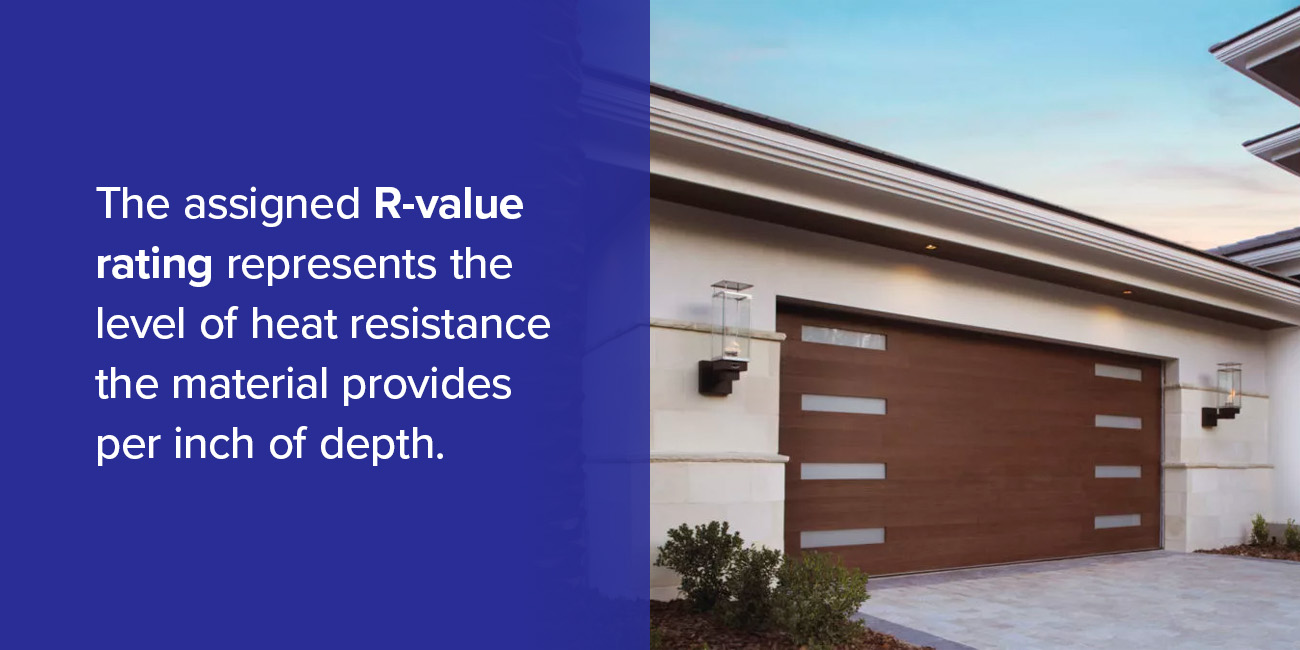An insulated garage door can add value to your home in several ways. This space can get hot, especially in the summer. Insulation helps keep the oppressive air outside. Your home will also be more energy-efficient with insulation, resulting in lower utility bills.
Insulation works by slowing down heat transfer — the process in which molecules move from areas of higher temperatures to lower ones. An insulation’s R-value measures the material’s ability to slow the transfer of heat.
What Do R-Value Ratings Mean?
If you’re shopping for an insulated garage door, you’ll likely encounter products with an R-value ranging from 6.3 to 20.4. A higher R-value means the door offers enhanced insulating properties. As a result, you can expect to pay more for a door at the upper end of the R-value scale.
Keep in mind that the assigned R-value rating represents the level of heat resistance the material provides per inch of depth. This means that insulation with a lower R-value could provide similar protection to a higher-rated product when using more material. For instance, 2 inches of R10 insulation can offer the same results as 1 inch of R20 insulation.
What R-Value of Insulation Does Your Garage Door Need?
Since the R-value of insulation for garage doors covers a broad range, choosing the right product for your home can be challenging. The performance of your home’s HVAC system is one factor to consider. If your unit is older and less efficient, you may need a higher R-value to compensate for any deficiencies.
Your garage door’s material also plays a role in the insulation selection process. If your door is made of steel or wood, the natural insulating properties can allow you to choose a lower R-value without sacrificing comfort. An aluminum or glass door may need a higher level of insulation to keep hot air out more consistently.
You should also consider the product type. Fiberglass batt insulation is a low-cost option, but it typically has a lower R-value and doesn’t offer much moisture protection. Its general R-value range is only 3.1 to 3.4. The two insulation types that people opt for are Polyurethane and Polystyrene. Polyurethane foam insulation is available with higher values and can often deliver better results in hotter climates.
Your choice of insulation also relates to whether the garage is attached to your home or a free-standing structure. A low R-value in an attached unit could let hot air into your home and make your cooling system work harder. You won’t have this concern with a detached unit, which means you could get away with lower insulation thickness or possibly do without it.
Get Expert Help From The Doorman of Southeast Florida
At The Doorman, we offer high-quality insulation garage doors from Clopay®, North America’s most trusted manufacturer. Choose from multiple products constructed with high-quality materials in a wide range of R-values to meet your requirements. They’re also WindCode-rated to ensure compliance with all local hurricane resistance standards. Their attractive design and style will dramatically improve your home’s appeal.
Contact us to learn more about the R-value of insulation and get expert product selection assistance today. We can also provide a free estimate with no obligation.

